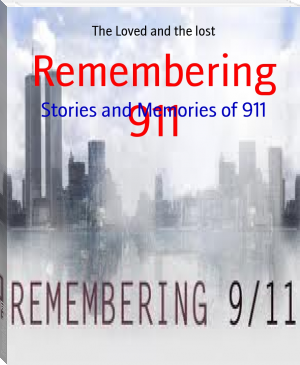The Story of My Life - Helen Keller (top rated ebook readers .txt) 📗

- Author: Helen Keller
- Performer: 0140439153
Book online «The Story of My Life - Helen Keller (top rated ebook readers .txt) 📗». Author Helen Keller
“I did tell baby, no, no, much (many) times,” was Helen’s reply.
I said, “Mildred doesn’t understand your fingers, and we must be very gentle with her.”
She shook her head.
“Baby—not think. Helen will give baby pretty letter,” and with that she ran upstairs and brought down a neatly folded sheet of braille, on which she had written some words, and gave it to Mildred, saying, “Baby can eat all words.”
September 18, 1887.
I do not wonder you were surprised to hear that I was going to write something for the report. I do not know myself how it happened, except that I got tired of saying “no,” and Captain Keller urged me to do it. He agreed with Mr. Anagnos that it was my duty to give others the benefit of my experience. Besides, they said Helen’s wonderful deliverance might be a boon to other afflicted children.
When I sit down to write, my thoughts freeze, and when I get them on paper they look like wooden soldiers all in a row, and if a live one happens along, I put him in a strait-jacket. It’s easy enough, however, to say Helen is wonderful, because she really is. I kept a record of everything she said last week, and I found that she knows six hundred words. This does not mean, however, that she always uses them correctly. Sometimes her sentences are like Chinese puzzles; but they are the kind of puzzles children make when they try to express their half-formed ideas by means of arbitrary language. She has the true language-impulse, and shows great fertility of resource in making the words at her command convey her meaning.
Lately she has been much interested in colour. She found the word “brown” in her primer and wanted to know its meaning. I told her that her hair was brown, and she asked, “Is brown very pretty?”
After we had been all over the house, and I had told her the colour of everything she touched, she suggested that we go to the hen-houses and barns; but I told her she must wait until another day because I was very tired. We sat in the hammock; but there was no rest for the weary there. Helen was eager to know “more colour.” I wonder if she has any vague idea of colour—any reminiscent impression of light and sound. It seems as if a child who could see and hear until her nineteenth month must retain some of her first impressions, though ever so faintly. Helen talks a great deal about things that she cannot know of through the sense of touch. She asks many questions about the sky, day and night, the ocean and mountains. She likes to have me tell her what I see in pictures.
But I seem to have lost the thread of my discourse. “What colour is think?” was one of the restful questions she asked, as we swung to and fro in the hammock. I told her that when we are happy our thoughts are bright, and when we are naughty they are sad. Quick as a flash she said, “My think is white, Viney’s think is black.” You see, she had an idea that the colour of our thoughts matched that of our skin. I couldn’t help laughing, for at that very moment Viney was shouting at the top of her voice: “I long to sit on dem jasper walls
And see dem sinners stumble and fall!”
October 3, 1887.
My account for the report is finished and sent off. I have two copies, and will send you one; but you mustn’t show it to anybody. It’s Mr. Anagnos’s property until it is published.
I suppose the little girls enjoyed Helen’s letter. She wrote it out of her own head, as the children say.
She talks a great deal about what she will do when she goes to Boston. She asked the other day, “Who made all things and Boston?” She says Mildred will not go there because “Baby does cry all days.”
October 25, 1887.
Helen wrote another letter to the little girls yesterday, and her father sent it to Mr. Anagnos. Ask him to let you see it. She has begun to use the pronouns of her own accord. This morning I happened to say, “Helen will go upstairs.” She laughed and said, “Teacher is wrong. You will go upstairs.” This is another great forward step. Thus it always is. Yesterday’s perplexities are strangely simple to-day, and to-day’s difficulties become tomorrow’s pastime.
The rapid development of Helen’s mind is beautiful to watch. I doubt if any teacher ever had a work of such absorbing interest.
There must have been one lucky star in the heavens at my birth, and I am just beginning to feel its beneficent influence.
I had two letters from Mr. Anagnos last week. He is more grateful for my report than the English idiom will express. Now he wants a picture “of darling Helen and her illustrious teacher, to grace the pages of the forthcoming annual report.”
October, 1887.
You have probably read, ere this, Helen’s second letter to the little girls. I am aware that the progress which she has made between the writing of the two letters must seem incredible. Only those who are with her daily can realize the rapid advancement which she is making in the acquisition of language. You will see from her letter that she uses many pronouns correctly. She rarely misuses or omits one in conversation. Her passion for writing letters and putting her thoughts upon paper grows more intense.
She now tells stories in which the imagination plays an important part. She is also beginning to realize that she is not like other children. The other day she asked, “What do my eyes do?” I told her that I could see things with my eyes, and that she could see them with her fingers. After thinking a moment she said, “My eyes are bad!” then she changed it into “My eyes are sick!”
Miss Sullivan’s first report, which was published in the official report of the Perkins Institution for the year 1887, is a short summary of what is fully recorded in the letters. Here follows the last part, beginning with the great day, April 5th, when Helen learned water.
In her reports Miss Sullivan speaks of “lessons” as if they came in regular order. This is the effect of putting it all in a summary. “Lesson” is too formal for the continuous daily work.
One day I took her to the cistern. As the water gushed from the pump I spelled “w-a-t-e-r.” Instantly she tapped my hand for a repetition, and then made the word herself with a radiant face.
Just then the nurse came into the cistern-house bringing her little sister. I put Helen’s hand on the baby and formed the letters “b-a-b-y,” which she repeated without help and with the light of a new intelligence in her face.
On our way back to the house everything she touched had to be named for her, and repetition was seldom necessary. Neither the length of the word nor the combination of letters seems to make any difference to the child. Indeed, she remembers HELIOTROPE and CHRYSANTHEMUM more readily than she does shorter names. At the end of August she knew 625 words.
This lesson was followed by one on words indicative of place-relations. Her dress was put IN a trunk, and then ON it, and these prepositions were spelled for her. Very soon she learned the difference between ON and IN, though it was some time before she could use these words in sentences of her own.
Whenever it was possible she was made the actor in the lesson, and was delighted to stand ON the chair, and to be put INTO the wardrobe. In connection with this lesson she learned the names of the members of the family and the word IS. “Helen is in wardrobe,” “Mildred is in crib,” “Box is on table,” “Papa is on bed,” are specimens of sentences constructed by her during the latter part of April.
Next came a lesson on words expressive of positive quality. For the first lesson I had two balls, one made of worsted, large and soft, the other a bullet. She perceived the difference in size at once. Taking the bullet she made her habitual sign for SMALL—that is, by pinching a little bit of the skin of one hand.
Then she took the other ball and made her sign for LARGE by spreading both hands over it. I substituted the adjectives LARGE
and SMALL for those signs. Then her attention was called to the hardness of the one ball and the softness of the other, and she learned SOFT and HARD. A few minutes afterward she felt of her little sister’s head and said to her mother, “Mildred’s head is small and hard.” Next I tried to teach her the meaning of FAST
and SLOW. She helped me wind some worsted one day, first rapidly and afterward slowly. I then said to her with the finger alphabet, “wind fast,” or “wind slow,” holding her hands and showing her how to do as I wished. The next day, while exercising, she spelled to me, “Helen wind fast,” and began to walk rapidly. Then she said, “Helen wind slow,” again suiting the action to the words.
I now thought it time to teach her to read printed words. A slip on which was printed, in raised letters, the word BOX was placed on the object, and the same experiment was tried with a great many articles, but she did not immediately comprehend that the label-name represented the thing. Then I took an alphabet sheet and put her finger on the letter A, at the same time making A with my fingers. She moved her finger from one printed character to another as I formed each letter on my fingers. She learned all the letters, both capital and small, in one day. Next I turned to the first page of the primer and made her touch the word CAT, spelling it on my fingers at the same time. Instantly she caught the idea, and asked me to find DOG and many other words. Indeed, she was much displeased because I could not find her name in the book. Just then I had no sentences in raised letters which she could understand; but she would sit for hours feeling each word in her book. When she touched one with which she was familiar, a





Comments (0)